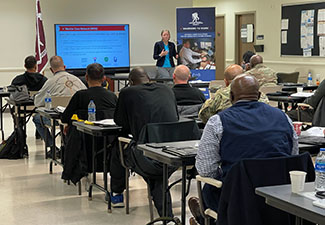Strategies for a Smoother Transition from Military Service

Transitioning from military life to civilian life can be a significant change for veterans but also an opportunity for a new beginning. Things like finding a new job or career, adjusting to financial changes, and connecting with new people can be difficult, but preparing for these changes can make the process easier.
There are additional challenges, like post-traumatic stress disorder (PTSD) or traumatic brain injury (TBI), that veterans face, but realizing you don’t have to navigate these challenges alone can be a big relief.
Wounded Warrior Project® (WWP) helps make these transitions easier regardless of where warriors are in their journeys. The life-changing programs and services offered by WWP™ can provide service members, veterans, and their families with the tools and resources to find employment, file for benefits, create budgets, and access mental and physical health and wellness support.
Preparing for Transition
There are steps active-duty service members can take to better prepare for the transition to civilian life. WWP’s transition-ready program aims to reach service members before they leave the military to equip and empower them for their next mission in life.
“We're here to inform warriors that this service is available both now and after you transition out, as many base services become inaccessible post-service," explained Lesly Marmolejos, career transition manager for WWP's Warriors to Work.”
WWP’s transition-ready program works with military installations and soldier recovery units (SRU) to connect wounded, injured, or ill service members with information, resources, and opportunities that better prepare them for a smooth transition. However, the team recognizes the nature of military service can sometimes throw a wrench in those plans.
“The ideal timeline can vary because you might plan to serve for 20 years, but then you get injured or plans change, and you have to be out within three months,' Lesly said. 'Everyone's on a different timeline, and that's OK.”
How much – or how little – time you have left in the service should determine the next steps.
“For someone with about two years to transition, my first recommendation is to think about what you want to do when you leave. Do you have the necessary certifications or education for that?' Lesly said. 'If not, let's start working on that now. Firstly, the military could still cover the costs while you're in, so you won't need to use your GI Bill. Secondly, it avoids the stress of having to complete it while also trying to find employment.”
The needs are more urgent for those with less time remaining in service.
“If you have a three-month timeframe, I would suggest connecting immediately with someone or an organization to start working on your benefits, creating a budget, and career planning,' Lesly said. 'My biggest tip is to make full use of the available resources in your area.”
How WWP Can Help
Whether you’re retiring from service after 20 years, completing your time in service, or facing medical discharge, WWP can help start you on the path toward your next mission.
Warriors to Work can help translate military skills into civilian job skills for a resume, as well as provide career counseling, interview prep, and networking.
“I think the nice thing about the military is that even though you are assigned a job title, it involves so much more. How many people were you supervising? What projects did you work on?” Lesly said. “We'll show their progression within their specific field – the supervisory skills they've learned, the leadership skills they've developed, and any type of training they’ve received.”
Whether it’s connecting to other veterans, finding employment, filing for VA benefits, improving your physical or mental health, or just having someone to talk to, WWP stands ready to serve the needs of post-9/11 veterans and their families.
“Everyone comes in at a different stage in their transition, and that's normal; that's OK,” Lesly said. “We can help you at whatever stage you’re in.”

Tips for Transitioning
Transitioning from the military to civilian life is a significant change, and proper preparation can make the process smoother and more successful. Here are some tips for transitioning service members:
Career Preparation
- Start early: Begin planning your transition at least a year before your separation date.
- Translate your skills: Learn to translate your military skills and experience into civilian terms. Tailor your resume to highlight how your military experience applies to civilian job roles.
- Career counseling: Take advantage of career counseling services offered by the military and other veterans service organizations.
- Networking: Build a network of contacts by attending job fairs, joining professional organizations, and connecting with veterans who have successfully transitioned.
Education and Training
- Education benefits: Utilize your GI Bill and education benefits to gain new skills or complete a degree.
- Certifications and licenses: Obtain any certifications or licenses required in your desired field.
- Skill enhancement: Consider taking additional training or courses to enhance your existing skills or learn new ones relevant to your career goals.
Financial Planning
- Budgeting: Create a budget to manage your finances during the transition period. Account for changes in income and expenses.
- Emergency fund: Build an emergency fund to cover unexpected expenses during the transition.
- Benefits: Understand the benefits you are entitled to, such as health care, unemployment, and disability benefits.
Personal Well-Being
- Mental health: Pay attention to your mental health. Transitioning can be stressful, and it's important to seek support if needed. VA offers mental health services for veterans.
- Physical health: Maintain a healthy lifestyle through regular exercise, a balanced diet, and regular medical check-ups.
- Family support: Involve your family in the transition process. Their support and understanding can make a big difference.
Legal and Administrative Tasks
- Documents: Ensure all your military records, including your DD214, are complete and in order.
- Housing: Plan your housing situation post-transition. Decide whether you will rent, buy, or use VA housing benefits.
- Insurance: Review and update your insurance coverage, including health, life, and auto insurance.
Transition Programs and Resources
- Transition Assistance Program (TAP): Participate in the Transition Assistance Program offered by the military, which provides valuable information and resources for transitioning service members.
- Veterans service organizations: Connect with organizations like Wounded Warrior Project, for additional support and resources.
- Career coaching services: Use career coaching services specifically designed for veterans, such as WWP’s Warriors to Work program.
Reflect and Set Goals
- Self-assessment: Reflect on your career goals, interests, and values. Consider what kind of work will fulfill you in the long term.
- Set goals: Set short-term and long-term goals for your career and personal life. Having clear objectives can help guide your transition process.
Contact: — Paris Moulden, Public Relations, pmoulden@woundedwarriorproject.org, 904.570.7910
About Wounded Warrior Project
Since 2003, Wounded Warrior Project® (WWP) has been meeting the growing needs of warriors, their families, and caregivers — helping them achieve their highest ambition. Learn more about Wounded Warrior Project.



